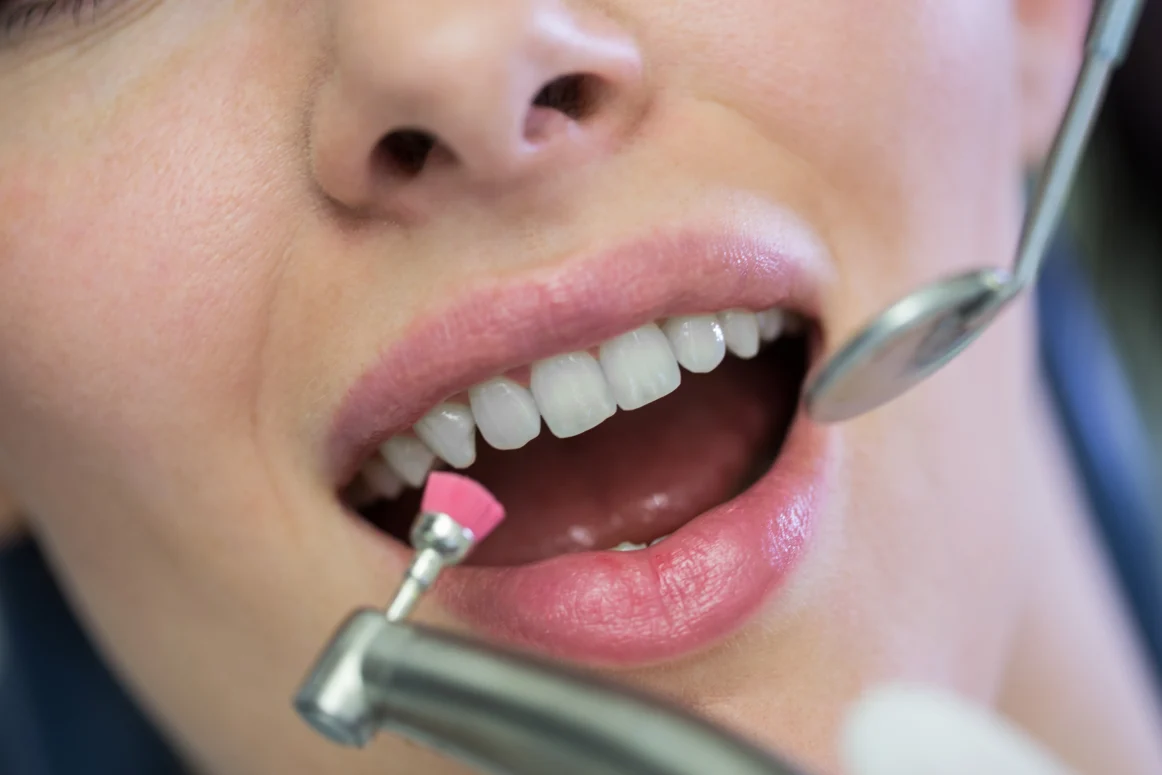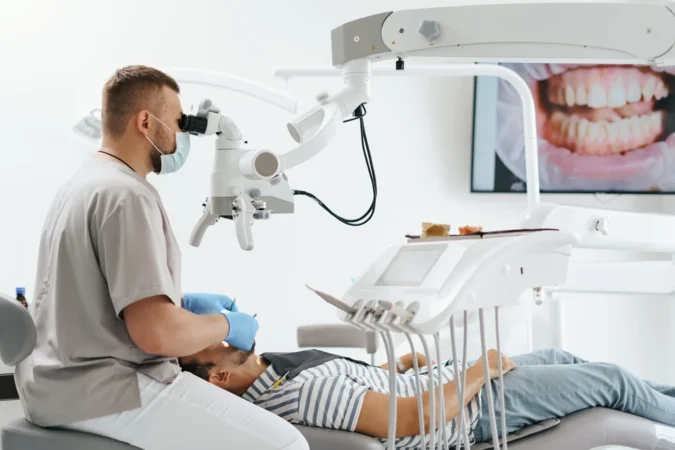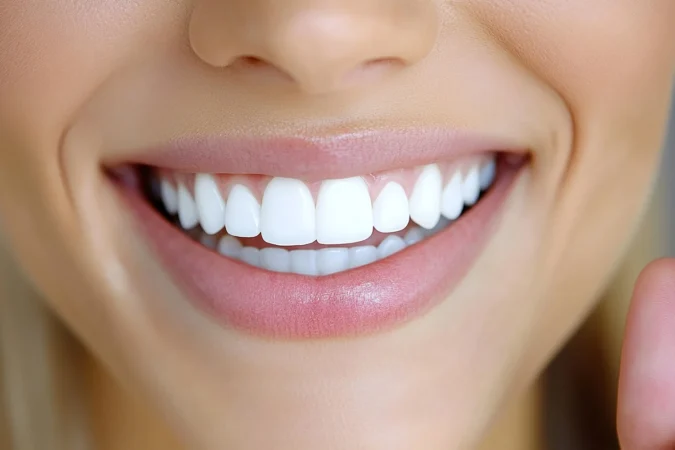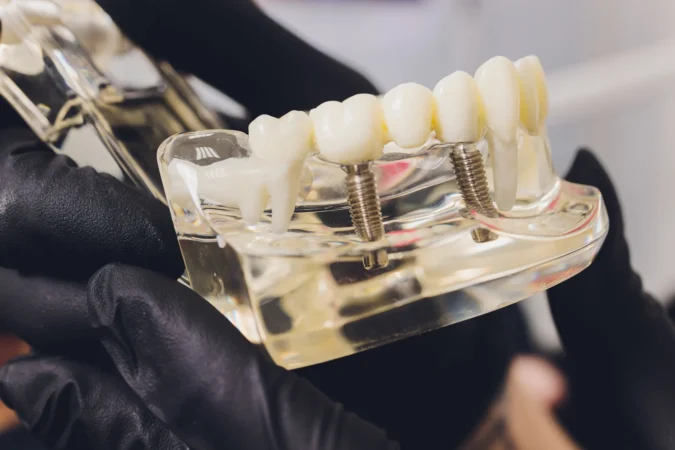Table of content
Table of content
Understanding Veneer Whitening: What’s Possible and What Isn’t
People begin to consider veneer whitening after they notice something is off during their mirror check or when they view their photos. The veneers which used to bring them confidence through their smile now appear less vibrant; as their colour no longer matches the surrounding natural teeth. The colour difference between veneers and neighboring teeth becomes more noticeable because coffee, tea or red wine have caused the natural teeth to darken. It’s completely normal at that point to wonder whether a whitening treatment could “fix” everything.
It’s important to note that veneers don’t respond to whitening the way natural teeth do. Once you start to understand how veneer materials work, it is easier to understand what whitening controls or indicates; and when a light polish or even a veneer replacement may or may not be better.
Can Veneers Be Whitened? The Truth
Hydrogen peroxide and other at-home whitening kits will not whiten porcelain veneers. The porous quality of natural teeth allows whitening gels to absorb into the tooth and alter the color. Porcelain, on the other hand, does not contain pores; therefore, the whitening gel cannot penetrate the veneer surface.
Whitening composite veneers creates minimal results which produce short-term color irregularities.
Nonetheless, having dark veneers for a long period of time does not mean you have to spend the rest of your life with dark teeth. The good news is that even if your veneers themselves cannot be chemically whitened, you still have several safe options to make your overall smile look brighter.
Consult Our Experts Now! If you’re not sure whether your veneers need polishing, whitening of the natural teeth, or complete replacement, our dentistry team at Dentspa can guide you. Book a free online assessment and get a personalised plan for your smile instead of guessing what to do next.
Why Veneers Look Darker Over Time (Even If They Don’t Actually Stain)
High-quality porcelain veneers are highly resistant to staining and typically retain their color for many years. However, lower-quality materials, heavy staining habits, or very old veneers can cause them to appear darker over time. In most cases, what changes first is the area around them:
- Teeth underneath the veneers darken
- NNatural teeth next to veneers stain from food and drinks
- The bonding cement may slightly discolor over many years
- Surface wear makes veneers look less reflective
The process of discoloration becomes faster when people drink red wine and coffee or smoke while consuming strongly colored foods.
How to Brighten Veneers Safely
Here’s what you can do if you’re unhappy with the color of your veneers:
1. Professional Dental Cleaning and Veneer Polishing
A gentle polish removes:
- surface stains
- plaque buildup
- dullness around the edges
This alone can restore a surprising amount of shine.
2. Whitening Your Natural Teeth
When natural teeth darken, veneers appear lighter; or vice versa.
Whitening the adjacent teeth creates balance again.
This approach is especially helpful if:
- Your natural teeth stain easily
- You drink tea or coffee
- You smoke
- Your original veneers were matched to a brighter shade
3. Teeth Whitening Underneath (In Some Cases)
If the tooth under the veneer has darkened, your dentist may be able to perform gentle internal whitening on that tooth;, but only in specific clinical scenarios.
4. Replacement of Too-Old-to-Restore Veneer
Some veneers eventually lose their shine or become discolored underneath. And sometimes replacing them is the only way to achieve a lighter shade compared to keeping the old ones.
Patients who have had their veneers completed for years should be seen by their dentist to do a cosmetic check-up every year. Regular visits to the office allow dentists to see if there are any early signs of staining on the margins, gum recession, or small chips that a patient cannot see. The annual check-up is simply protective care for an often long-term investment in their dental health.
Am I a Candidate for Veneer Brightening or Replacement?
You may be a good candidate if:
- You have surface stains on your veneers
- The natural teeth around your veneers have darkened
- Your veneers are losing shine
- Your veneers are older than 15-20 years
- You’re unhappy with the uneven color in photos
- You want to correct discoloration from food and drinks
- You want a brighter, fresher smile without damaging the veneers
You may not be a candidate for whitening treatments if:
- Your porcelain veneer color is permanently different
- the bonding cement is dark beneath the veneer
- your veneer has internal discoloration
- the veneer is chipped or worn
- the underlying tooth is severely stained
In these cases, replacement is usually the best option.
Make your appointment online today. If you recognize any of these signs in your smile, you don’t have to decide alone.
What to Expect After the Procedure (Cleaning, Whitening, or Replacement)
Depending on the treatment selected, you may notice:
- immediate improvement in veneer shine
- brighter natural teeth around the veneers
- improved uniformity in photos
- smoother veneer edges
- a refreshed, healthier appearance overall
The results from veneer replacement will last for multiple years when you properly care for them.
Having veneers doesn’t replace normal tooth care; you still need to brush and floss them just like your natural teeth to protect both the veneers and the teeth underneath.
Why Many Patients Choose Turkey for Their Dental Tourism
Turkey is a preferred destination for patients considering veneer upgrades or replacements because of:
- modern clinics using advanced cosmetic dentistry technology
- highly trained aesthetic dentists with extensive veneer experience
- fast appointment availability
- full travel support (airport pickup, hotel coordination, translation)
- significantly lower costs than in Europe or the US.
For instance, within the United States, a single porcelain veneer will typically range between $900 to $2,500 per tooth, while comparable clinics in Turkey will offer the same quality for roughly 60 to 70% cheaper than the U.S. equivalent. Many of our patients like it because they can mix dental treatment with experiencing the culture, history, and scenery of Turkey as well.
Why Choose DentSpa
There are many dental clinics in Turkey, but DentSpa is different because of its expertise in cosmetic dentistry, technology, and planning and preparation. Veneers are very detailed restorations, and even small changes in color, shape, or fit make a noticeable difference.
DentSpa offers:
- PhD-level specialist doctors experienced in veneer design and smile aesthetics
- Professors and associate professors supervising and performing complex cosmetic cases
- Best quality porcelain and composite materials designed for natural-looking results
- Digital smile design tools to plan the ideal shape, shade, and alignment before treatment
- Clear explanations about costs, options (cleaning, whitening of natural teeth, or veneers replaced), and expected results
- Gentle clinical techniques and supportive staff who guide you through each step
- Complete A–Z care and aftercare, with follow-up for long-term veneer maintenance
DentSpa combines European-level cosmetic dentistry at a price that’s affordable and manageable for international patients looking for balanced, bright ADA -approved veneers, without sacrificing quality.
Next Steps for a Brighter Smile
To summarize, in a tooth whitening procedure, the colour of your veneers will not change,; however, you can brighten your smile. The best approach will depend on the state of the veneers,: simply polish or whiten your surrounding natural teeth, or replace the veneers for a larger change.
DentSpa specialists can assist in determining what will work best for your situation. You can book a free online consultation through our website.
Our team also offers complimentary shade analysis to help you find your ideal smile colour and decide whether whitening, cleaning, or replacement is the right next step for you.
Your brighter smile is one message away.
Visit our website: https://dentspa.com/.
Frequently asked questions
When should veneers be replaced?
Generally, veneers should be replaced when there is internal staining, cracking or chipping, or the underlying bonding materials are dark. Most dentists will recommend replacing veneers every years for high-quality veneers, even in the absence of staining or damage, just to maintain a bright and natural smile.
Are composite veneers more prone to staining than porcelain types?
Yes. Composite veneers are more prone to staining than porcelain veneers due to the porous structure of the composites; so they will better absorb stains from red wine, coffee, tea, or tobacco, causing their discoloration.
How can I remove stains from my veneers safely?
The removal of surface stains becomes possible through dental cleaning services performed by professionals and veneer polishing treatments. The treatment for discolorations that exist under veneers or inside teeth requires either whitening procedures or complete replacement of the affected teeth.
Why do my veneers look darker or more yellow over time?
High-quality porcelain veneers tend to keep their colour for many years, especially when well cared for. However, with time, the tooth underneath, the bonding cement, and the natural teeth around them can darken, and in some cases, older or lower-quality veneers themselves may also look darker.
Can veneers be whitened or made lighter with whitening treatments?
No. The non-porous structure of porcelain veneers blocks all peroxide and whitening gel penetration, which makes whitening impossible. Your smile will look better through veneer polishing, natural tooth whitening, or by replacing old veneers.

















 70%
70% 

